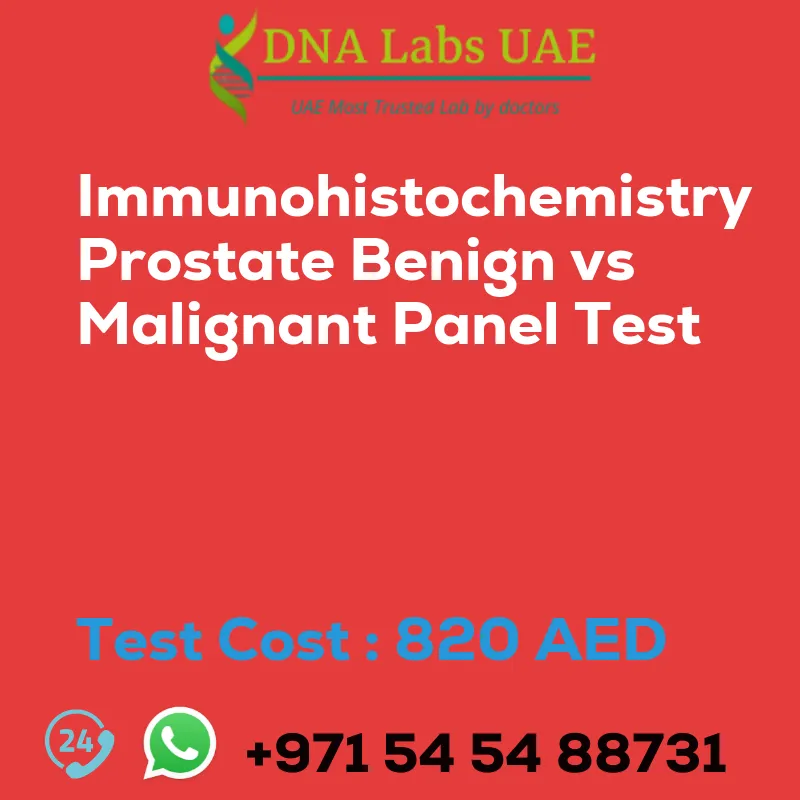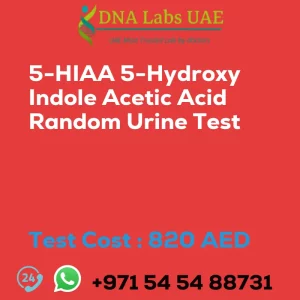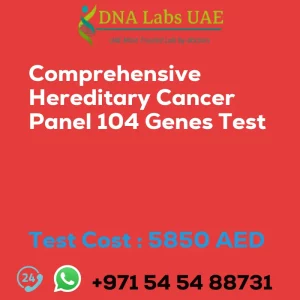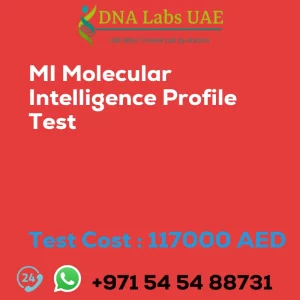IMMUNOHISTOCHEMISTRY PROSTATE BENIGN VS MALIGNANT PANEL Test
Test Name: IMMUNOHISTOCHEMISTRY PROSTATE BENIGN VS MALIGNANT PANEL Test
Test Components: AMACR, CK5/6, p63
Price: 820.0 AED
Sample Condition: Submit tumor tissue in 10% Formal-saline OR Formalin fixed paraffin embedded block. Ship at room temperature. Provide a copy of the Histopathology report, Site of biopsy and Clinical history.
Report Delivery: Sample Daily by 6 pm; Report Block: 5 days Tissue Biopsy: 5 days Tissue large complex: 7 days
Method: Immunohistochemistry
Test type: Cancer
Doctor: Oncologist, Pathologist
Test Department: HISTOLOGY
Pre Test Information: Provide a copy of the Histopathology report, Site of biopsy and Clinical history.
Test Details
Immunohistochemistry (IHC) is a technique used in pathology to detect specific proteins in tissue samples. In the case of prostate cancer, IHC can be used to distinguish between benign and malignant cells by identifying the presence or absence of certain markers.
A panel of IHC markers commonly used to differentiate between benign and malignant prostate cells includes:
- Prostate-specific antigen (PSA): PSA is a protein produced by the prostate gland. It is typically elevated in prostate cancer but may also be present in benign conditions such as benign prostatic hyperplasia (BPH). However, PSA staining alone is not sufficient to differentiate between benign and malignant cells.
- High molecular weight cytokeratin (HMWCK): HMWCK is a marker of basal cells in the prostate gland. In benign prostate tissue, basal cells are typically present, while they are absent in malignant cells. Therefore, positive staining for HMWCK indicates benign cells, while negative staining suggests malignancy.
- P63: P63 is another marker of basal cells in the prostate gland. Similar to HMWCK, positive staining for P63 indicates benign cells, while negative staining suggests malignancy.
- Alpha-methylacyl-CoA racemase (AMACR): AMACR is an enzyme involved in fatty acid metabolism. It is overexpressed in prostate cancer cells but is usually absent in benign cells. Positive staining for AMACR indicates malignancy.
- Ki-67: Ki-67 is a marker of cell proliferation. It is typically higher in malignant cells compared to benign cells. High Ki-67 staining suggests increased cell proliferation and is indicative of malignancy.
By analyzing the staining patterns of these markers, pathologists can determine whether the prostate tissue is benign or malignant. However, it is important to note that the interpretation of IHC results should be done in conjunction with other clinical and pathological findings to arrive at an accurate diagnosis.
| Test Name | IMMUNOHISTOCHEMISTRY PROSTATE BENIGN VS MALIGNANT PANEL Test |
|---|---|
| Components | *AMACR*CK5/6*p63 |
| Price | 820.0 AED |
| Sample Condition | Submit tumor tissue in 10% Formal-saline OR Formalin fixed paraffin embedded block. Ship at room temperature. Provide a copy of the Histopathology report, Site of biopsy and Clinical history. |
| Report Delivery | Sample Daily by 6 pm; Report Block: 5 days Tissue Biopsy: 5 days Tissue large complex : 7 days |
| Method | Imunohistochemistry |
| Test type | Cancer |
| Doctor | Oncologist, Pathologist |
| Test Department: | HISTOLOGY |
| Pre Test Information | Provide a copy of the Histopathology report, Site of biopsy and Clinical history. |
| Test Details |
Immunohistochemistry (IHC) is a technique used in pathology to detect specific proteins in tissue samples. In the case of prostate cancer, IHC can be used to distinguish between benign and malignant cells by identifying the presence or absence of certain markers. A panel of IHC markers commonly used to differentiate between benign and malignant prostate cells includes: 1. Prostate-specific antigen (PSA): PSA is a protein produced by the prostate gland. It is typically elevated in prostate cancer but may also be present in benign conditions such as benign prostatic hyperplasia (BPH). However, PSA staining alone is not sufficient to differentiate between benign and malignant cells. 2. High molecular weight cytokeratin (HMWCK): HMWCK is a marker of basal cells in the prostate gland. In benign prostate tissue, basal cells are typically present, while they are absent in malignant cells. Therefore, positive staining for HMWCK indicates benign cells, while negative staining suggests malignancy. 3. P63: P63 is another marker of basal cells in the prostate gland. Similar to HMWCK, positive staining for P63 indicates benign cells, while negative staining suggests malignancy. 4. Alpha-methylacyl-CoA racemase (AMACR): AMACR is an enzyme involved in fatty acid metabolism. It is overexpressed in prostate cancer cells but is usually absent in benign cells. Positive staining for AMACR indicates malignancy. 5. Ki-67: Ki-67 is a marker of cell proliferation. It is typically higher in malignant cells compared to benign cells. High Ki-67 staining suggests increased cell proliferation and is indicative of malignancy. By analyzing the staining patterns of these markers, pathologists can determine whether the prostate tissue is benign or malignant. However, it is important to note that the interpretation of IHC results should be done in conjunction with other clinical and pathological findings to arrive at an accurate diagnosis. |








